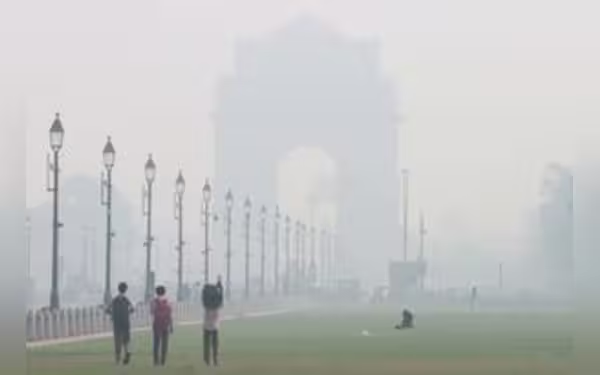Saturday, November 16, 2024 07:53 PM
Delhi Air Quality Crisis: AQI Remains Very Poor
- Delhi's AQI recorded at 335, remains unhealthy.
- Severe pollution levels exceed 400 in multiple areas.
- CAQM enforces removal of old polluting vehicles.
 Image Credits: menafn
Image Credits: menafnDelhi's air quality remains 'very poor' with an AQI of 335, prompting urgent measures from CAQM to combat pollution.
New Delhi is grappling with a persistent air quality crisis, as the Air Quality Index (AQI) continues to hover in the 'very poor' category. On November 10, the AQI was recorded at 335, indicating that the air remains unhealthy for the residents of the national capital. Despite a slight improvement from previous days, the situation is far from safe, with pollution hotspots still showing alarming levels of contamination.
On Saturday, several areas, including Bawana, New Moti Bagh, Rohini, Vivek Vihar, and Wazirpur, reported 'severe' pollution levels, with AQI readings exceeding 400. To put this into perspective, an AQI between zero and 50 is considered 'good', while anything above 300 falls into the 'very poor' category. The alarming figures highlight the urgent need for effective measures to combat air pollution in the city.
In response to this ongoing crisis, the Commission for Air Quality Management (CAQM) has taken decisive steps to address the issue. The CAQM has directed intensified actions to remove highly polluting end-of-life (EoL) vehicles from the roads. This includes petrol vehicles older than 15 years and diesel vehicles older than 10 years, which are still being used in Delhi. A recent meeting led by the CAQM Chairperson focused on reviewing the progress of the Graded Response Action Plan (GRAP), which aims to tackle air pollution in hotspots and other priority areas.
The CAQM emphasized the importance of strict enforcement of regulations, stating that immediate action must be taken against violators to ensure accountability. Delays in addressing complaints have been identified as a significant barrier to effective air quality management, prompting the need for a more proactive approach.
Additionally, the Municipal Corporation of Delhi (MCD) has been tasked with reviewing the parking fee structure in public spaces. This initiative aims to encourage residents to opt for public transportation, thereby reducing the number of vehicles on the road and, consequently, the pollution levels.
As the air quality crisis continues to affect the health and well-being of Delhi's residents, it is crucial for both authorities and citizens to work together. While the government implements measures to improve air quality, individuals can also contribute by using public transport, carpooling, or even walking short distances. Every small effort counts in the fight against air pollution, and together, we can strive for a cleaner, healthier environment for all.













